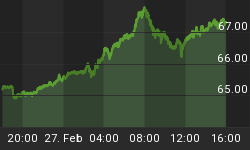For the first time in over five years the European Central Bank (ECB) today shifted its bias toward easing. In his subsequent comments, President Trichet stated that the ECB had "no bias" regarding future monetary policy moves, and refused to be drawn on the likelihood of a lower refi rate before year's end. However, the Council reportedly discussed only two options: leaving rates unchanged or easing. The focus of the Council statement was on the negative impact of the ongoing financial market turmoil. Trichet also pointed to clear evidence of a weakening Euro-zone economy as domestic demand contracts and financing conditions tighten. He stated that lower oil prices and ongoing growth in emerging economies "might support a gradual recovery in the course of 2009" - which is a distinctly more pessimistic assessment than he was making in early September.
Chart 1
Trichet's inflation forecast also shifted somewhat this month, from seeing the annual rate fall back to the 2.0% target "in the course of 2010" to anticipating price stability "at the beginning of 2010." He did reiterate that, while weakening demand diminishes upside risks to price stability, "they have not disappeared." Nevertheless, the overall tone of his press conference was decidedly dovish. The euro promptly fell against the US$ on expectations of a 25bps cut to the refi rate at the November 6 policy meeting. Interestingly, the Council and President also appeared to set the stage today for participation in a coordinated action with other central banks before then. With money market tensions still worsening despite massive central bank liquidity injections, rates at ECB auctions pushed to record highs, and Euro-zone economic data increasingly gloomy, the refi rate will very likely be 4.00% before the end of this year, and head still lower through the first half of 2009.















